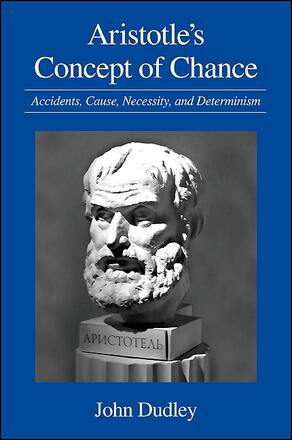Preface
Introduction
PART I: CHANGE IN THE PHYSICS OF ARISTOTLE
1. The doctrine of Phys. II, iv-vi i. Context and method
ii. Terminology
iii. Only unusual occurrences come about by chance
iv. Chance refers to events
v. Some events are meaningful and others are not
vi. Chance events are both unusual and meaningful
vii. Chance is a cause
viii. Chance is an accidental cause that is meaningful
ix. Chance as an accidental cause can pertain to any category
x. Chance events are inherently unpredictable
xi. The relationship of τύχη to τέχνη; their outcomes are contingent
xii. Both good luck and bad luck are meaningful
xiii. Good luck
xiv. The distinction between τύχη and ταὐτόματον
xv. The relationship of ταὐτόματον to μάτην
xvi. Substances generated counter to nature fall under ταὐτόματον
xvii. Chance, νοῦς and φύσις 2. The structure of Phys. II, iv-vi
3. Dating Phys. II, vi
a. Texts in which τύχη covers all of chance
b. τύχη in Aristotle’s mature metaphysical writings i. the meaning of ταὐτόματον καί τύχη
ii. Inconclusive passages in the later metaphysical writings
iii. The sources of generation
iv. Note on Met. K
v. Conclusion 4. Necessity and Chance
a. Aristotle’s concept of necessity i. Introduction
ii. Absolute necessity
iii. Final causes are not derived by absolute necessity
iv. The necessity of the Unmoved Mover
v. Hypothetical necessity
vi. Degrees of hypothetical necessity
vii. Force
viii. Fate
ix. The correspondence of the four causes to absolute and hypothetical necessity
x. The coincidence of hypothetical and absolute necessity
xi. The distinction in subject-matter and method between physics and the other two theoretical sciences
xii. Accidents occur by absolute and not by hypothetical necessity
xiii. There is no science of the unusual accident
xiv. Necessity in relation to man b. Necessity and chance: Aristotle’s criticism of the Presocratics i. The compatibility of necessity and chance in Greek thought
ii. Necessity and chance in Democritus
iii. Conclusion Additional notes to chapter IV
a. Phys. VIII, iv
b. Plato’s concept of chance
c. Empedocles’ zoogony
d. Phys. II, iv, 196 a 28-33
5. The causes of that which occurs by chance
a. Chance events
b. Monsters
c. spontaneous generation
i. The vocabulary of spontaneous generation
ii. The causes of spontaneous generation
iii. The evolution of the theory of spontaneous
d. The parallel between chance events and chance substances i. The unusualness of monsters and spontaneous generation
ii. The unusual category and the efficient cause e. Conclusion
PART II: CHANCE IN THE ETHICS OF ARISTOTLE
6. Chance as the source of external prosperity
a. The necessity of external prosperity
b. Good fortune throughout a complete live (βίος τέλειος) is necessary for perfect happiness i. Aristotle recognizes the existence of various degrees of happiness ii. The happiness sought in the ethical works is perfect happiness
iii. Perfect happiness must last throughout life
iv. Perfect happiness requires a “complete life” (βίοςτέλειος)
v. Perfect happiness on one day and in a complete lifetime
vi. Chance, external prosperity and happiness 7. Chance and Intuition
a. The doctrine of τύχη in EE VIII, ii
b. The doctrine of good fortune (εὐτυχία) in MM II, viii
Additional note on the chronology of Aristotle’s ethical works
Appendix I. Chance in the lists of the sources of happiness in NE and EE
Appendix II. Differences in the role of chance in NE, EE, and MM
PART III: IMPLICATIONS OF ARISTOTLE’S CONCEPT OF CHANCE
8. Chance and Aristotle’s rejection of determinism
a. Determinism and final causality
b. Determinism and efficient causality i. Human free choice
ii. Unusual accidents: Met. E(VI), iii
iii. Chance iv. Conclusion Additional note on determinist interpretations of Aristotle’s philosophy of nature
9. Aristotle’s concept of chance and related contemporary questions
a. Chance and the order in the universe
b. Chance and the origin of live
c. Chance and evolution i. Aristotle’s analogy of substance
ii. Teleology
iii. The operation of chance d. Quantum theory
e. Conclusion
Conclusion
a. Textual conclusions
b. Doctrinal conclusions
Bibliography
Index locorum
Index nominum
Index rerum
